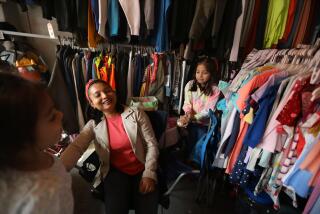Op-Ed: Crowdfunding fails most of those in need
A GoFundMe campaign is a poor — and unfair — substitute for functional social programs.
The crowdfunding business, to which hundreds of thousands of people turned for help with rent and other basic needs during the pandemic, may well be a platform for “inspiring acts of kindness,” but every donation also dictates who is being left behind. This is no safety net; it’s a system of “socially mediated abandonment,” amplifying inequality.
GoFundMe is likely to see another spike as expanded benefits like unemployment insurance and eviction moratoriums come to an end in California and elsewhere. Expect a repeat of the disparities we found when we studied more than 160,000 campaigns that were started for COVID-related causes in the first seven months of the pandemic.
Many appeals were for basic needs and personal crises caused by the pandemic and its economic fallout. Although COVID-related campaigns in our study did collectively raise more than $416 million, nearly half of them did not get a single donation. The typical campaign raised a mere $65 from two donors, toward a request of $5,000, and more than 90% of campaigns did not reach their goals. Among those who did not get any donations was a self-described “black veteran” seeking $30,000 in July 2020. He wrote: “have had covid-19 for 4 months, lost job, lost car, lost home.”
Much of the money raised in those 160,000 campaigns went to a rarified group of individuals with links to wealthy donors, celebrities, influencers and corporate sponsors. GoFundMe worked out well for golf caddies at L.A.’s most prestigious courses, employees of high-end restaurants, and shopkeepers in the Hamptons. The top 1% of campaigns claimed nearly a quarter of all earnings.
Because crowdfunding largely enables users to appeal to their own networks for support, campaign outcomes reflect the vast inequities in wealth and privilege that lie beneath the veneer of American “opportunity.” In areas with higher levels of education and income, COVID-19 campaigns raised more money. Those areas with higher education and income also produced more campaigns overall — meaning that fewer campaigns were created in the places that needed them most.
In other recent research, we found that crowdfunding results replicate underlying patterns of racial inequality in the United States, and that these unequal results are strongly related to the varying funds available in users’ social networks because of place, race and ethnicity.
America has a long history of helping others during times of crisis. Although many of us felt encouraged by neighbors and communities mobilizing support for those in need during the pandemic, certain ways of helping — like crowdfunding — reinforced broader social inequities. GoFundMe, which earns revenue through “tips” on donations through its platform, is the ultimate winner.
Crowdfunding is simply no way to address a social crisis. If a doctor offered us a treatment for a deadly illness that, like crowdfunding, succeeded only 10% of the time, mostly for those who are healthiest, and didn’t work at all for 40% of patients … well, we certainly wouldn’t call it inspiring.
Expanded social support programs like universal healthcare, paid family leave, universal child care and expanded disability benefits are preventive, upstream interventions that ensure Americans don’t have to rely on inequitable “kindness” from the crowd.
This may be our first crowdfunded pandemic, but it won’t be the last crisis in which Americans are forced to seek help online. As many brace for another summer of climate-related disasters, crowdsourced and crowdfunded help is already mobilizing to respond. The need is certainly real — in crises of climate, public health, poverty, etc. But the fix isn’t giving money to the best-connected individuals. The solution can only be long-term public investment in broad social support programs to more equitably address — or, better yet, prevent — these tragedies.
Nora Kenworthy is an associate professor of nursing and health studies at the University of Washington, Bothell. Mark Igra is a PhD candidate in the department of sociology at the University of Washington, Seattle.
More to Read
A cure for the common opinion
Get thought-provoking perspectives with our weekly newsletter.
You may occasionally receive promotional content from the Los Angeles Times.










